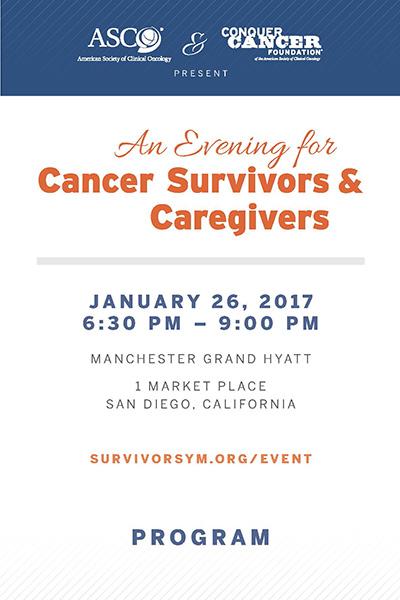
This post was first published on ASCO Connection, February 1, 2017. ASCOConnection.org is the professional networking site for the American Society of Clinical Oncology (ASCO) and the companion website for ASCO’s official member magazine, ASCO Connection.
On January 26, prior to the official opening of the second annual Cancer Survivorship Symposium, cancer survivors, caregivers, patient advocates, family physicians, oncology providers, and others gathered in San Diego, CA, to make connections, discuss survivorship issues, and get expert answers on their survivorship-related questions.
“An Evening for Cancer Survivors and Caregivers” was moderated by Kevin C. Oeffinger, MD, Program Committee Chair for the 2017 Cancer Survivorship Symposium and director of the cancer survivorship center at Memorial Sloan Kettering Cancer Center. He opened the event by noting that, happily, more people are surviving cancer than ever before: 14.5 million cancer survivors in the United States alone and millions more across the globe. “We are here tonight to discuss the issues that are important to you, to hear from you, and to hear from others who have faced the same fears that you have,” he told the audience.
The evening’s panelists came from diverse backgrounds, but each represented an intersection of professional and personal interests in cancer survivorship:
-
Ann Partridge, MD, MPH, FASCO, a medical oncologist and survivorship researcher at the Dana-Farber Cancer Institute and Harvard Medical School, supported a close friend through a breast cancer diagnosis.
-
Belinda Vail, MD, MS, a family physician at the University of Kansas School of Medicine, is the mother of Hodgkin lymphoma survivor.
-
Richard Dickens, MS, LCSW-R, a licensed social worker and director of client advocacy at CancerCare, is a survivor of non-Hodgkin lymphoma since 1994.
-
Samantha Watson, MBA, CEO and founder of The Samfund, which provides direct financial assistance and online support to young adults with cancer, is a survivor of Ewing sarcoma and myelodysplastic syndrome since 1999.
The majority of the evening was dedicated to an open forum, during which attendees were invited to share their stories and pose questions to the panelists.
Self-advocacy was a touchstone of the discussion, as attendees brought attention to the challenges they face in managing their survivorship care. Panelists acknowledged that the largest burden of coordinating care falls to the survivor and that the system can be frustrating to navigate.
If attendees were to do only 1 thing after leaving the event, panelists said, they should make sure they have a treatment summary and survivorship plan documenting their exact diagnosis, specific treatments received, and recommended follow-up care, filled out by their oncologist and shared with their primary care provider.  Attendees who don’t have a summary and care plan should be vocal and insist on getting this information from their cancer care team.
Attendees who don’t have a summary and care plan should be vocal and insist on getting this information from their cancer care team.
“The patient voice is the most powerful thing. When we want change, it occurs because patients voice what that change needs to be,” Dr. Oeffinger said.
That voice can also be used in the larger service of patient advocacy, which many survivors find empowering and which can lead to a renewed sense of meaning and purpose after cancer. “Advocacy can seem so overwhelming, but you don’t have to start a whole new nonprofit,” Mr. Dickens said. “Get involved with an established organization, share your passion, and continue to build a network in your community and elsewhere, because change can happen.”
Patient advocates can inform the development of new models of care and access that improve survivor well-being, be champions for cancer research, support one another through the “emotional emergencies” that a physician is not always equipped or available to manage, and raise awareness and disseminate information about survivorship to the larger community.
“We’re very lucky right now to have so many opportunities to share our stories and get information out there” using technology and social media, Ms. Watson said. “It’s our responsibility as cancer survivors to speak up for those who come after us.”
Community and teamwork was a thread that ran through many of the questions and responses.
